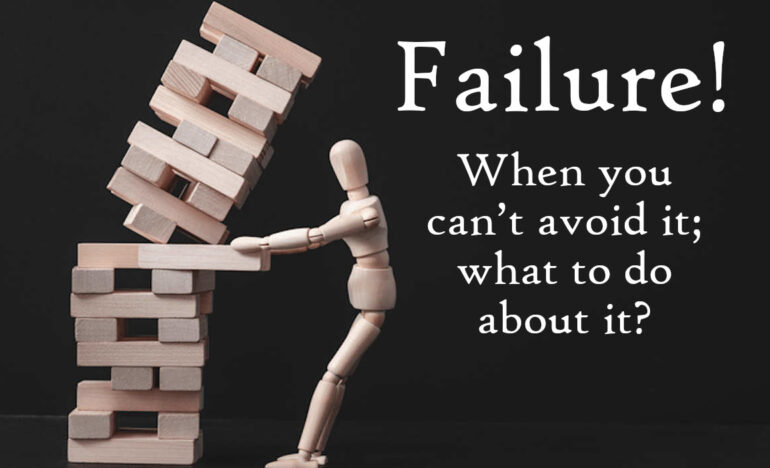Failure: When you can’t avoid it, what to do about it?

An Assembling God’s Puzzle video
Life hands us many puzzle pieces that we have to figure out what to do with, but one that almost no one likes is failure. We avoid failure at all costs, but we just can’t get away from it. Maybe some of us experienced that puzzle piece recently when our New Year’s resolution fell apart after only a few days. But we experience many failures in life, like gaining weight when we try to lose it, our business fails, we get fired, we go into bankruptcy, we don’t get the grade we wanted in school, our marriage fails, etc.
Once we label something a failure, it is pretty much impossible to feel good about it. Even worse, when we label ourselves a failure, we’re pretty much done. There’s nowhere else to go but into depression and hopelessness. So how can we situate this puzzle piece in our lives so it doesn’t cause so much pain?
One thing we can do is change the way we judge whether something is a failure or a success. We all use some kind of measuring stick or gauge in order to do this, and often we use a gauge that is unhelpful and even unrealistic. The gauge we usually use is whether or not the outcome of our efforts, the end product, is what was expected. Society uses this gauge all the time. An expected outcome is set up ahead of time, and if our actions don’t achieve that outcome, we are considered a failure.
The trouble is that outcomes are often dependent on many things, not just my efforts. For example, my golf score is dependent on my performance, but it is also dependent on the weather conditions on the day I play golf. Weather is beyond my control. Or if I’m working on a project with coworkers and the outcome is not what was wanted, the failure wasn’t just because of me. Using outcomes of actions is not a useful or realistic way of judging myself (or anyone else) a success or failure.
So what is a better gauge of success or failure? One possibility is to ask “Did I do the best I could with what I had?” Doing one’s best is dependent on nothing else but one’s self. Also, doing one’s best is always possible. Doing one’s best is not the same as doing something perfectly. I can’t run a 4-minute mile (which may be someone’s idea of success), but I can run a mile in some amount of time that can be my best. That is doing the best with what I’ve got.
Or I can’t possibly know all the possible outcomes that can result from a particular choice so I can choose the perfect option. But I can choose the option that makes the most sense to me with the knowledge I do have.
“With what we’ve got” does not equate with being all-powerful or all-knowing. If I’m sick, my best in attending to my family will be different than if I am well. But it can still be my best. My best today may be different than my best tomorrow, but I can do my best both days. Even God doesn’t expect more from us than our best. That would be irrational and impossible.
If God wanted perfection, God would have made us perfect.
In my experience, all of us generally do the best with what we’ve got. I’ve never heard someone say “I could do my best but I won’t, even though I don’t have a reason.” I’ve heard many people say that their actions didn’t have the results they wanted despite their best efforts, and they consider it a failure.
Using a different gauge of success/failure can make a big difference. And if we can use a more realistic gauge for proclaiming success or failure for ourselves, we will most likely be judging others a little bit less critically also. That would probably make this world a much better place.
All of the videos in this series can be found here: Assembly God’s Puzzle.
Never miss an article published on the Renewal Center website: Sign up to receive our newsletters.
[Fr. Garry Richmeier, a Precious Blood priest and spiritual director, holds a Master’s of Divinity Degree from St John’s University in Collegeville, Minnesota, and a Master’s of Counseling Psychology degree from the University of Missouri-Kansas City. He is a licensed professional counselor and a licensed marriage and family therapist.]
Photo 143591587 / Failure © Golubovy | Dreamstime.com
We’d Like to Hear from You!
We’d like to know what you think about this article. Send us a comment using the form below. Do you have a suggestion? Is there something you want to learn more about? Send us a note.
Related

Take Nothing for the Journey
An Assembling God’s Puzzle video
By Fr. Garry Richmeier, C.PP.S.
Jesus’ teaching about what to take on a journey — nothing — is actually good advice for building trusting relationships. Don’t bring your “stuff” into the relationship; listen deeply and respec their views and situation, understand their struggles.

Pilgrims of Hope, Episode 6: Walking with Cancer Survivors
Hosted by Fr. Ron Will, C.PP.S.
We are talking with people who find hope amid difficult circumstances or bring hope to others. In this episode, Kathy Keary talks about how centering prayer, journaling and other spiritual practices helped her cope with two life threatening health issues.
Categories
Assembling God's Puzzle Coffee with Padre Cooking & Spirituality Encounters of the 4th Kind Family Matters Reflections on the Eucharsitic Prayers Spiritual Resources Taize Prayers The Contemplative Life Traveling with Pilgrims of Hope Uncategorized Videos Week of Prayer for Uhristian Unity When you need a little help
